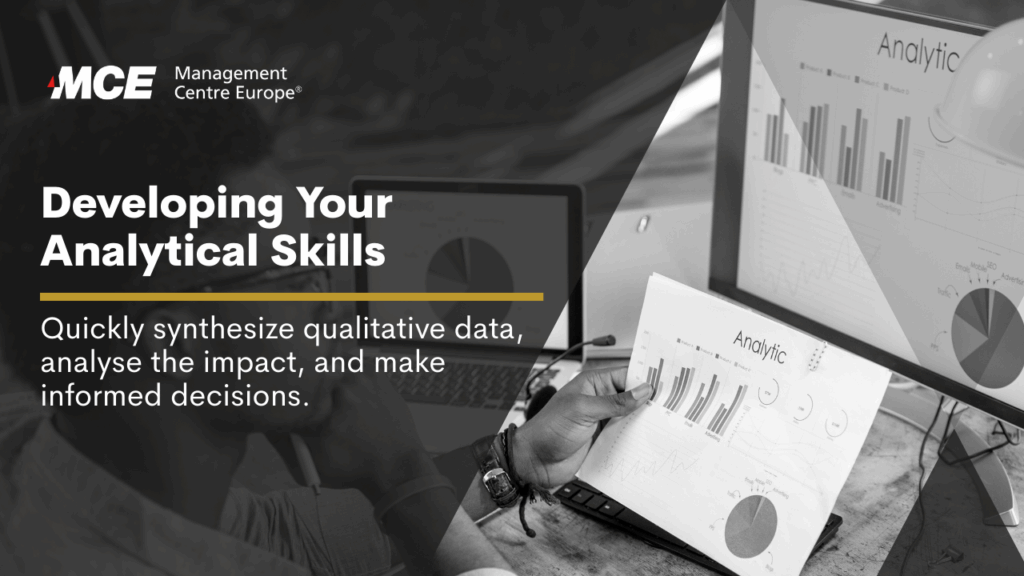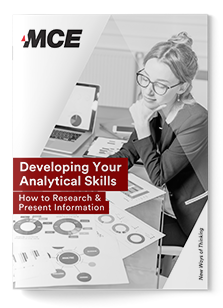- OPEN TRAINING PROGRAMMES
MCE's 3 Leadership Areas
Skills to manage yourself & your work
(Leading Self)
-
Communication & PresentationCommunication & Presentation
-
Influencing & NegotiationInfluencing & Negotiation
-
Conflict ManagementConflict Management
-
Time & Stress ManagementTime & Stress Management
-
Analytics & Strategic ThinkingAnalytics & Strategic Thinking
Skills to lead & motivate others
(Leading Others)
-
LeadershipLeadership
-
Women's Leadership CentreWomen's Leadership Centre
-
Managing People & TeamsManaging People & Teams
-
Diversity, Equity and InclusionDiversity, Equity and Inclusion
-
Managing ChangeManaging Change
Skills to drive organisational success
(Leading Business)
-
AMA-CPM® CertificationAMA-CPM® Certification
-
Business Strategy & PlanningBusiness Strategy & Planning
-
Finance & ControllingFinance & Controlling
-
Project ManagementProject Management
-
AI & Digital TransformationAI & Digital Transformation
-
Sales & MarketingSales & Marketing
-
Innovation & AgilityInnovation & Agility
-
HR & Talent ManagementHR & Talent Management
Available in Various Cities Throughout EMEA
SEE ALLAvailable as Public Programmes or Self-Paced OnDemand Courses

-
Live OnlineLive Online Live, interactive sessions for busy international schedules.

-
OnDemand LibraryOnDemand Library Self-paced e-learning courses
Discover MCE Programmes For Your Industry

-
Materials & MiningMaterials & Mining

-
Government & International OrganizationsGovernment & International Organizations

-
BankingBanking
Find the Right Learning Solutions For Your Current Or Future Role
More Options
-
OnDemand CoursesOnDemand Courses
-
MCE WeeksMCE Weeks
-
MCE EssentialsMCE Essentials
-
Virtual Reality ModulesVirtual Reality Modules
-
Women's Leadership CentreWomen's Leadership Centre
-
What Leadership is ForBook PromoWhat Leadership is For
Search your programme by
Other Options
-
OnDemand CoursesOnDemand Courses
-
MCE WeeksMCE Weeks
-
MCE EssentialsMCE Essentials
-
Virtual Reality ModulesVirtual Reality Modules
-
Women's Leadership CentreWomen's Leadership Centre
-
What Leadership is ForBook PromoWhat Leadership is For
-
- MINI MBA’S
MCE Mini MBA
Moving from Technical Expert to International Business Manager.
Learning Options
- 5 days in person
- 12 online sessions
Next Sessions
- 16 Mar – 20 Mar 2026 (Milan)
- 23 Mar – 27 Mar 2026 (Vienna)
- 23 Mar – 27 Mar 2026 (Helsinki)
- 23 Mar – 27 Mar 2026 (Istanbul)
Mini MBA's tailored to your Industry
MCE Mini MBA
Develop your all-round managerial skills in only 5 days or 12 online sessions and boost your management career.
-
Learn moreLearn more
Mini MBA's tailored to your Industry
-
PharmaceuticalPharmaceutical
-
EnergyEnergy
-
ChemicalChemical
-
MiningMining
-
Retail BankingRetail Banking
-
Medical DevicesMedical Devices
- COMPANY & TEAM SOLUTIONS
Solutions for your Company & Teams
-
MCE's Customized Learning SolutionsMCE's Customized Learning Solutions
-
The MCE Approach - Focusing on Your Goals & NeedsThe MCE Approach - Focusing on Your Goals & Needs
-
Client StoriesClient Stories
-
MCE Services for Your CompanyMCE Services for Your Company
Quicklinks
-
Licensing of ProgrammesLicensing of Programmes
-
AMA-CPM® Certification
-
All Access PassesAll Access Passes
Save up to 50% on your training budget
One annual budget. Flexible use across programmes throughout the year
-
- INSIGHTS
Business Resources
-
Download MCE Training GuideHighlightDownload MCE Training Guide
-
Essential Skills and Industries InsightsEssential Skills and Industries Insights
-
Artificial Intelligence (AI)Artificial Intelligence (AI)
-
LeadershipLeadership
-
Life Sciences IndustryLife Sciences Industry
-
Women's Leadership CentreWomen's Leadership Centre
-
and more...and more...
-
Business ArticlesBusiness Articles
-
Research & WhitepapersResearch & Whitepapers
Get Our Latest Updates
Subscribe to our email newsletters that highlight our latest research-based articles, products, programmes, and more to help you strengthen your leadership skills.
Building Leadership Capability for an AI-Enabled Organisation
Helping leaders and professionals use AI with confidence, judgment, and responsibility.
-
- OPEN TRAINING PROGRAMMES
MCE's 3 Leadership Areas
Skills to manage yourself & your work
(Leading Self)
-
Communication & PresentationCommunication & Presentation
-
Influencing & NegotiationInfluencing & Negotiation
-
Conflict ManagementConflict Management
-
Time & Stress ManagementTime & Stress Management
-
Analytics & Strategic ThinkingAnalytics & Strategic Thinking
Skills to lead & motivate others
(Leading Others)
-
LeadershipLeadership
-
Women's Leadership CentreWomen's Leadership Centre
-
Managing People & TeamsManaging People & Teams
-
Diversity, Equity and InclusionDiversity, Equity and Inclusion
-
Managing ChangeManaging Change
Skills to drive organisational success
(Leading Business)
-
AMA-CPM® CertificationAMA-CPM® Certification
-
Business Strategy & PlanningBusiness Strategy & Planning
-
Finance & ControllingFinance & Controlling
-
Project ManagementProject Management
-
AI & Digital TransformationAI & Digital Transformation
-
Sales & MarketingSales & Marketing
-
Innovation & AgilityInnovation & Agility
-
HR & Talent ManagementHR & Talent Management
Available in Various Cities Throughout EMEA
SEE ALLAvailable as Public Programmes or Self-Paced OnDemand Courses

-
Live OnlineLive Online Live, interactive sessions for busy international schedules.

-
OnDemand LibraryOnDemand Library Self-paced e-learning courses
Discover MCE Programmes For Your Industry

-
Materials & MiningMaterials & Mining

-
Government & International OrganizationsGovernment & International Organizations

-
BankingBanking
Find the Right Learning Solutions For Your Current Or Future Role
More Options
-
OnDemand CoursesOnDemand Courses
-
MCE WeeksMCE Weeks
-
MCE EssentialsMCE Essentials
-
Virtual Reality ModulesVirtual Reality Modules
-
Women's Leadership CentreWomen's Leadership Centre
-
What Leadership is ForBook PromoWhat Leadership is For
Search your programme by
Other Options
-
OnDemand CoursesOnDemand Courses
-
MCE WeeksMCE Weeks
-
MCE EssentialsMCE Essentials
-
Virtual Reality ModulesVirtual Reality Modules
-
Women's Leadership CentreWomen's Leadership Centre
-
What Leadership is ForBook PromoWhat Leadership is For
-
- MINI MBA’S
MCE Mini MBA
Moving from Technical Expert to International Business Manager.
Learning Options
- 5 days in person
- 12 online sessions
Next Sessions
- 16 Mar – 20 Mar 2026 (Milan)
- 23 Mar – 27 Mar 2026 (Vienna)
- 23 Mar – 27 Mar 2026 (Helsinki)
- 23 Mar – 27 Mar 2026 (Istanbul)
Mini MBA's tailored to your Industry
MCE Mini MBA
Develop your all-round managerial skills in only 5 days or 12 online sessions and boost your management career.
-
Learn moreLearn more
Mini MBA's tailored to your Industry
-
PharmaceuticalPharmaceutical
-
EnergyEnergy
-
ChemicalChemical
-
MiningMining
-
Retail BankingRetail Banking
-
Medical DevicesMedical Devices
- COMPANY & TEAM SOLUTIONS
Solutions for your Company & Teams
-
MCE's Customized Learning SolutionsMCE's Customized Learning Solutions
-
The MCE Approach - Focusing on Your Goals & NeedsThe MCE Approach - Focusing on Your Goals & Needs
-
Client StoriesClient Stories
-
MCE Services for Your CompanyMCE Services for Your Company
Quicklinks
-
Licensing of ProgrammesLicensing of Programmes
-
AMA-CPM® Certification
-
All Access PassesAll Access Passes
Save up to 50% on your training budget
One annual budget. Flexible use across programmes throughout the year
-
- INSIGHTS
Business Resources
-
Download MCE Training GuideHighlightDownload MCE Training Guide
-
Essential Skills and Industries InsightsEssential Skills and Industries Insights
-
Artificial Intelligence (AI)Artificial Intelligence (AI)
-
LeadershipLeadership
-
Life Sciences IndustryLife Sciences Industry
-
Women's Leadership CentreWomen's Leadership Centre
-
and more...and more...
-
Business ArticlesBusiness Articles
-
Research & WhitepapersResearch & Whitepapers
Get Our Latest Updates
Subscribe to our email newsletters that highlight our latest research-based articles, products, programmes, and more to help you strengthen your leadership skills.
Building Leadership Capability for an AI-Enabled Organisation
Helping leaders and professionals use AI with confidence, judgment, and responsibility.
-
- OPEN TRAINING PROGRAMMES
MCE's 3 Leadership Areas
Skills to manage yourself & your work
(Leading Self)
-
Communication & PresentationCommunication & Presentation
-
Influencing & NegotiationInfluencing & Negotiation
-
Conflict ManagementConflict Management
-
Time & Stress ManagementTime & Stress Management
-
Analytics & Strategic ThinkingAnalytics & Strategic Thinking
Skills to lead & motivate others
(Leading Others)
-
LeadershipLeadership
-
Women's Leadership CentreWomen's Leadership Centre
-
Managing People & TeamsManaging People & Teams
-
Diversity, Equity and InclusionDiversity, Equity and Inclusion
-
Managing ChangeManaging Change
Skills to drive organisational success
(Leading Business)
-
AMA-CPM® CertificationAMA-CPM® Certification
-
Business Strategy & PlanningBusiness Strategy & Planning
-
Finance & ControllingFinance & Controlling
-
Project ManagementProject Management
-
AI & Digital TransformationAI & Digital Transformation
-
Sales & MarketingSales & Marketing
-
Innovation & AgilityInnovation & Agility
-
HR & Talent ManagementHR & Talent Management
Available in Various Cities Throughout EMEA
SEE ALLAvailable as Public Programmes or Self-Paced OnDemand Courses

-
Live OnlineLive Online Live, interactive sessions for busy international schedules.

-
OnDemand LibraryOnDemand Library Self-paced e-learning courses
Discover MCE Programmes For Your Industry

-
Materials & MiningMaterials & Mining

-
Government & International OrganizationsGovernment & International Organizations

-
BankingBanking
Find the Right Learning Solutions For Your Current Or Future Role
More Options
-
OnDemand CoursesOnDemand Courses
-
MCE WeeksMCE Weeks
-
MCE EssentialsMCE Essentials
-
Virtual Reality ModulesVirtual Reality Modules
-
Women's Leadership CentreWomen's Leadership Centre
-
What Leadership is ForBook PromoWhat Leadership is For
Search your programme by
Other Options
-
OnDemand CoursesOnDemand Courses
-
MCE WeeksMCE Weeks
-
MCE EssentialsMCE Essentials
-
Virtual Reality ModulesVirtual Reality Modules
-
Women's Leadership CentreWomen's Leadership Centre
-
What Leadership is ForBook PromoWhat Leadership is For
-
- MINI MBA’S
MCE Mini MBA
Moving from Technical Expert to International Business Manager.
Learning Options
- 5 days in person
- 12 online sessions
Next Sessions
- 16 Mar – 20 Mar 2026 (Milan)
- 23 Mar – 27 Mar 2026 (Vienna)
- 23 Mar – 27 Mar 2026 (Helsinki)
- 23 Mar – 27 Mar 2026 (Istanbul)
Mini MBA's tailored to your Industry
MCE Mini MBA
Develop your all-round managerial skills in only 5 days or 12 online sessions and boost your management career.
-
Learn moreLearn more
Mini MBA's tailored to your Industry
-
PharmaceuticalPharmaceutical
-
EnergyEnergy
-
ChemicalChemical
-
MiningMining
-
Retail BankingRetail Banking
-
Medical DevicesMedical Devices
- COMPANY & TEAM SOLUTIONS
Solutions for your Company & Teams
-
MCE's Customized Learning SolutionsMCE's Customized Learning Solutions
-
The MCE Approach - Focusing on Your Goals & NeedsThe MCE Approach - Focusing on Your Goals & Needs
-
Client StoriesClient Stories
-
MCE Services for Your CompanyMCE Services for Your Company
Quicklinks
-
Licensing of ProgrammesLicensing of Programmes
-
AMA-CPM® Certification
-
All Access PassesAll Access Passes
Save up to 50% on your training budget
One annual budget. Flexible use across programmes throughout the year
-
- INSIGHTS
Business Resources
-
Download MCE Training GuideHighlightDownload MCE Training Guide
-
Essential Skills and Industries InsightsEssential Skills and Industries Insights
-
Artificial Intelligence (AI)Artificial Intelligence (AI)
-
LeadershipLeadership
-
Life Sciences IndustryLife Sciences Industry
-
Women's Leadership CentreWomen's Leadership Centre
-
and more...and more...
-
Business ArticlesBusiness Articles
-
Research & WhitepapersResearch & Whitepapers
Get Our Latest Updates
Subscribe to our email newsletters that highlight our latest research-based articles, products, programmes, and more to help you strengthen your leadership skills.
Building Leadership Capability for an AI-Enabled Organisation
Helping leaders and professionals use AI with confidence, judgment, and responsibility.
-
































